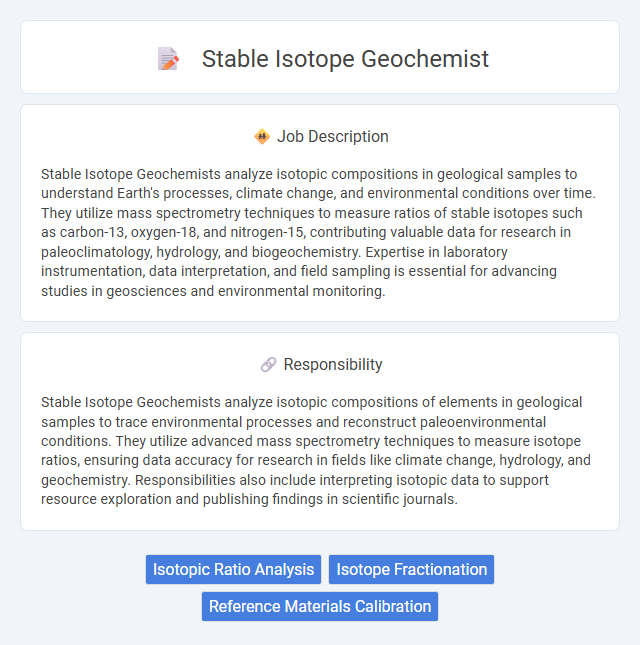
Stable Isotope Geochemists analyze isotopic compositions in geological samples to understand Earth's processes, climate change, and environmental conditions over time. They utilize mass spectrometry techniques to measure ratios of stable isotopes such as carbon-13, oxygen-18, and nitrogen-15, contributing valuable data for research in paleoclimatology, hydrology, and biogeochemistry. Expertise in laboratory instrumentation, data interpretation, and field sampling is essential for advancing studies in geosciences and environmental monitoring.
Individuals with strong analytical skills and a keen interest in earth sciences will likely thrive as Stable Isotope Geochemists. Those comfortable working in laboratory settings under precise conditions and willing to engage in detailed, often repetitive measurements may find this role suitable. People who prefer dynamic, varied environments or less technical work might face challenges adapting to the specialized nature of this job.
Qualification
A Stable Isotope Geochemist typically requires a strong background in geochemistry, chemistry, or earth sciences, often demonstrated by a Master's or Ph.D. degree. Expertise in stable isotope analysis techniques such as mass spectrometry and experience with laboratory instruments like isotope ratio mass spectrometers are essential. Proficiency in data interpretation, geochemical modeling, and research design enhances job performance in academic, environmental, or industrial settings.
Responsibility
Stable Isotope Geochemists analyze isotopic compositions of elements in geological samples to trace environmental processes and reconstruct paleoenvironmental conditions. They utilize advanced mass spectrometry techniques to measure isotope ratios, ensuring data accuracy for research in fields like climate change, hydrology, and geochemistry. Responsibilities also include interpreting isotopic data to support resource exploration and publishing findings in scientific journals.
Benefit
The role of a Stable Isotope Geochemist likely offers significant benefits such as advancing scientific understanding of earth processes through isotope analysis. Professionals in this field probably enjoy opportunities for research collaboration and access to cutting-edge laboratory technology. There is also potential for contributing to environmental monitoring and resource management, which may enhance career fulfillment and impact.
Challenge
A Stable Isotope Geochemist likely faces challenges in accurately interpreting isotope ratios due to potential contamination or alteration of samples. The complexity of natural systems may complicate the differentiation between biotic and abiotic processes, requiring advanced analytical techniques. There is also a probable need to constantly update skills with emerging technologies to maintain precision and reliability in geochemical analyses.
Career Advancement
A Stable Isotope Geochemist advancing in their career typically moves from entry-level research roles to senior positions such as lead scientist or laboratory manager, gaining expertise in isotope ratio mass spectrometry and geochemical modeling. Mastery of analytical techniques and contributions to high-impact publications enhance prospects for roles in academia, government research institutions, or environmental consulting firms. Continuous professional development through workshops and collaboration on interdisciplinary projects supports upward mobility and leadership opportunities in geochemistry.
Key Terms
Isotopic Ratio Analysis
Stable isotope geochemists specialize in isotopic ratio analysis to trace environmental processes and geological history with precision. They utilize mass spectrometry techniques to measure variations in isotopic abundances of elements such as carbon, oxygen, and nitrogen, providing critical data for climate reconstruction and geochemical cycling studies. Expertise in interpreting isotopic signatures supports applications ranging from paleoclimate research to resource exploration and environmental monitoring.
Isotope Fractionation
Stable isotope geochemists specialize in analyzing isotope fractionation processes to understand chemical, physical, and biological transformations in Earth systems. They apply mass spectrometry techniques to measure variations in isotopic ratios, which reveal insights into paleoenvironmental conditions, climate change, and biogeochemical cycles. Expertise in isotope fractionation mechanisms enables precise tracing of fluid sources, mineral formation pathways, and environmental interactions.
Reference Materials Calibration
Stable isotope geochemists specializing in reference materials calibration ensure the accuracy and consistency of isotopic data by developing and validating standardized reference materials. Their expertise in calibrating mass spectrometers with these reference materials is critical for precise measurement of isotopic ratios in geological and environmental samples. The role involves meticulous quality control protocols and inter-laboratory comparisons to maintain data integrity across diverse geochemical analyses.
 kuljobs.com
kuljobs.com